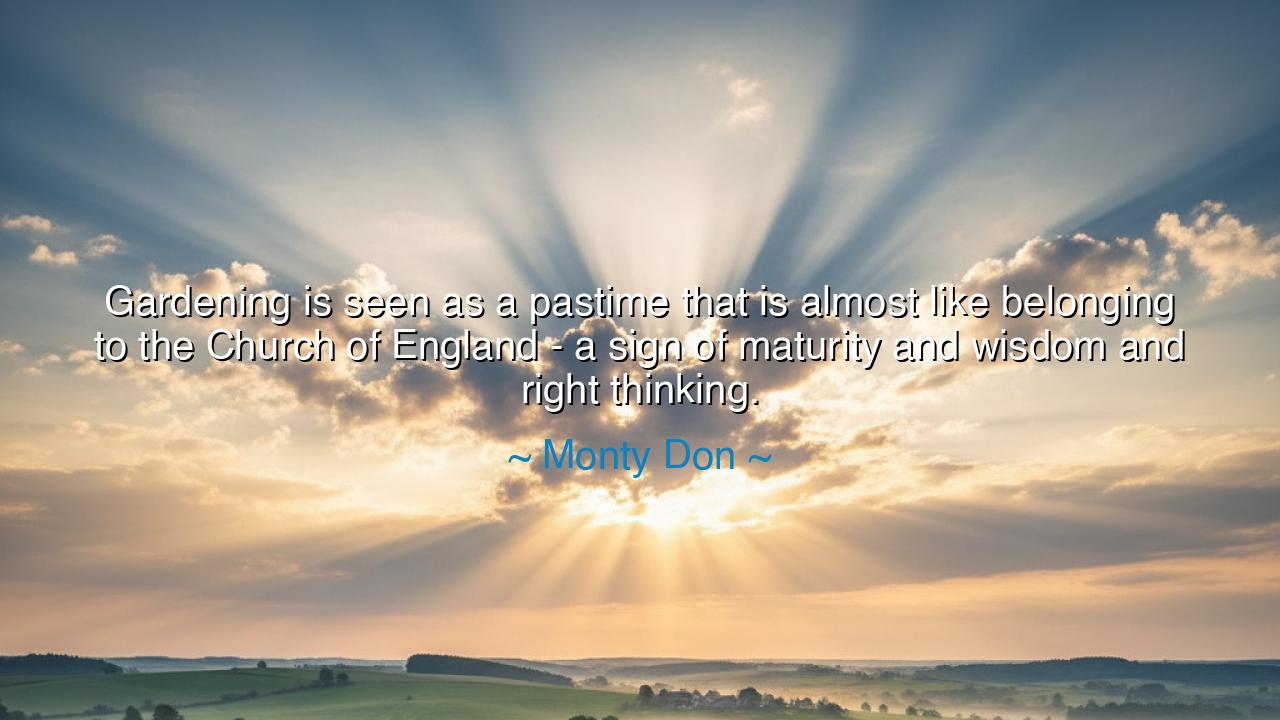
Gardening is seen as a pastime that is almost like belonging to
Gardening is seen as a pastime that is almost like belonging to the Church of England - a sign of maturity and wisdom and right thinking.






In the quiet wisdom of the garden, there is an ancient truth that has endured through the ages—a truth that speaks not just to the body but to the spirit. Monty Don, in his observation, speaks to this truth when he says, "Gardening is seen as a pastime that is almost like belonging to the Church of England—a sign of maturity and wisdom and right thinking." These words resonate deeply, for they point to a profound understanding of the human connection to the earth. To garden is not simply to tend to plants, but to participate in an ancient ritual that brings balance, growth, and understanding to the soul. Just as the Church offers its followers a sense of order and guidance, so too does the garden provide a sanctuary for the mind and heart.
The ancient Greeks believed that the relationship between humans and nature was central to understanding the deeper truths of the universe. The philosopher Aristotle spoke of eudaimonia, or flourishing, which was achieved through living in accordance with nature. For Aristotle, the act of working the land—planting, tending, and harvesting—was not simply a matter of survival, but a way of living wisely and virtuously. Gardening, in this sense, was seen as an act of great maturity—a reflection of one’s understanding of the natural cycles of life, death, and renewal. To tend to the earth was to participate in the greater order of the cosmos, just as the wise citizen of ancient Athens would strive to live in harmony with the world around them.
In the same vein, Monty Don’s words remind us that gardening is more than a hobby—it is a reflection of a life lived with purpose and understanding. The garden, like the Church of England, offers a form of discipline and structure. In a world often marked by chaos and disorder, gardening provides a sanctuary of order—a space where the gardener can slow down, observe, and understand the rhythms of life. Just as the Church provides its followers with a sense of spiritual direction, so too does the garden offer its tenders a deep sense of spiritual nourishment. The act of gardening becomes a form of meditation, a way to reconnect with the natural world and cultivate not just plants, but wisdom and peace.
Consider the example of the medieval monks, who, in their quiet monasteries, tended gardens as an act of spiritual devotion. The famous Cistercian monks of Cluny Abbey were renowned for their gardens, which were not just practical, but sacred. They planted herbs, flowers, and vegetables with an eye toward meditation and prayer. The garden, in this context, was not simply a space for cultivation, but a place where the monk could contemplate the divine and the natural world. Through the act of tending to the earth, they were able to cultivate the virtues of patience, humility, and gratitude—qualities that were deeply valued by the Church. Gardening, in their hands, was both an act of spiritual reflection and practical wisdom.
The garden, in all its forms, has long been a symbol of maturity. The Romans, in their grand villas, created lush gardens that reflected the grandeur of their civilization, but they also saw the garden as a place of retreat for the mind. To walk through the garden, to tend to it with care, was to step away from the distractions of daily life and immerse oneself in the simple joys of nature. The Roman poet Virgil, in his work Georgics, celebrated the life of the farmer and the gardener, praising them as wise men who understood the ways of the earth. Gardening, for Virgil, was not just about growing food, but about cultivating wisdom—about recognizing the connection between humans and nature, and understanding that the work of the land was a reflection of the work of the soul.
Monty Don’s comparison of gardening to the Church of England calls us to see the sacredness of the garden in our own lives. Just as one finds guidance and order within the walls of a church, so too can we find these qualities in the garden. Gardening teaches us the importance of patience, of attunement to the rhythms of life, and of perseverance. It reminds us that the process of growth—whether in the garden or in our own lives—is slow, steady, and requires great care. It is in these simple, repetitive acts—of planting, watering, and tending—that we find the deeper meaning of life. The garden, like the Church, offers a space for reflection, growth, and connection to something greater than ourselves.
In our fast-paced modern world, it is easy to forget the wisdom that gardens offer us. Let us take a lesson from Monty Don’s words and embrace gardening not just as a pastime, but as a sacred practice. Let us approach the garden with the same reverence that one would approach a place of worship, knowing that in it, we cultivate not just plants, but a deeper understanding of life, patience, and wisdom. Whether we are planting seeds in a small window box or tending to a vast garden, let us remember that in this simple act, we are participating in a timeless tradition of growth, both of the earth and of the soul. May we, like the ancient philosophers and gardeners before us, find peace, purpose, and wisdom in the work of the garden, and may it lead us to a deeper connection with the world around us.






AAdministratorAdministrator
Welcome, honored guests. Please leave a comment, we will respond soon